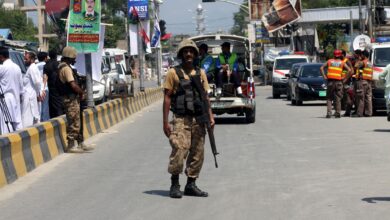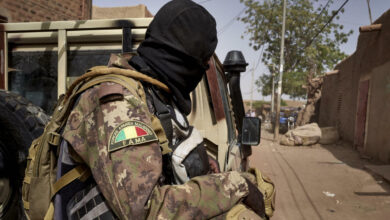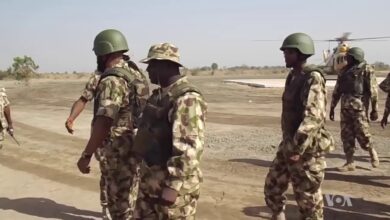- ISIS claims Borno state attacks kill 20 soldiers
- Military says 100 militants 'neutralised' in Borno and Yobe state operations
- Buhari acknowledges setbacks in Boko Haram fight
At least three people were killed in two attacks by both factions of Boko Haram as Nigeria’s president acknowledged setbacks in the fight against the nine-year insurgency.
On Monday evening, militants from the Islamic State West Africa province Boko Haram faction attacked a military facility in Auno, some 23 km (15 miles) from Borno state capital, Maiduguri.
Babakura Kolo, a member of the Civilian Joint Task Force militia, said soldiers and the Civilian JTF in Auno were attacked by ISWA insurgents.
“There was heavy fighting and the gunmen were repelled with the help of a fighter jet,” he told AFP.
“The insurgents had two days ago warned residents of [nearby] Jakana to vacate their homes by Wednesday because they were going to launch a major attack.”
Also on Monday evening, fighters loyal to factional leader Abubakar Shekau attacked Sajeri village on the outskirts of the Borno state capital, Maiduguri, killing three people, AFP reported.
Boko Haram split into two factions in mid-2016 over ideological differences. One is led by Abu Mus’ab Al-Barnawi and largely focuses on attacking military and government targets, while the other, led by Abubakar Shekau, is notorious for suicide bombings and indiscriminate killings of civilians.
Shekau has pledged allegiance to ISIS leader Abu Bakr Al-Baghdadi, but ISIS central gave its formal backing to the Barnawi faction, which is known as Islamic State West Africa province.
ISWA has lately intensified its armed campaign, launching a number of major assaults on military targets in Borno and neighboring Yobe state amid signs of a takeover by more hardline leaders.
There have been dozens of attacks on military bases since July. Most have been blamed on ISWA, or claimed by ISIS as ISWA attacks, but there has been an upsurge in attacks by both factions in recent weeks.
ISIS claims Borno state attacks kill 20 soldiers
On Sunday, ISIS claimed ISWA fighters had carried out several attacks in northeastern Nigeria.
It said that at least 15 Nigerian soldiers were killed and others wounded in an attack in Damasak on Saturday, adding that three tanks and two four-wheel drive vehicles were burned.
On January 3, a Nigerian Air Force Mi-35 helicopter gunship crashed near Damasak killing all five crew members. The aircraft was lost during “ongoing counterinsurgency operations,” an air force spokesperson said.
Also on Saturday, five Nigerian soldiers were injured when their four-wheel drive vehicle was struck by a roadside bomb between Mart and Karinu, while on Friday, five were killed in a roadside bomb blast between Monguno and Merari, ISIS claimed.
Military says 100 militants ‘neutralized’ in Borno and Yobe state operations
Meanwhile, the Nigerian army said more than 100 Boko Haram militants were “neutralized” in military operations.
Troops “embarked on aggressive clearance operations on suspected Boko Haram terrorists hideouts and crossing points” around Damasak, Kross Kauwa and Monguno in Borno State and Goniri in Yobe State, Brigadier General Sani Kukasheka Usman, Director Army Public Relations said in a statement published on Facebook on Monday but dated as Sunday.
The “120 Battalion and the newly formed Nigerian Army Special Forces Command have neutralised over 100 Boko Haram terrorists in various encounters,” the statement said, adding that the Nigerian Air Force was giving close air support to ground troops and pursuing fleeing insurgents in ongoing operations.
Several Boko Haram “gun trucks and facilities” were destroyed by the air force, Usman said.
Troops “have also been repelling attempted efforts by the terrorists to infiltrate their locations” and the battle has “further shifted to the fringes of Lake Chad and other suspected Boko Haram terrorists enclave along the borders,” Usman added.
Usman’s statement came hours after the military raided newspaper offices in Maiduguri, Abuja and Lagos after a front-page story about the handling of the Boko Haram insurgency was published.
Computers were seized and two journalists were detained in Maiduguri following the Daily Trust story about military plans to recapture the town of Baga on the shores of Lake Chad.
In late December, fighters from the ISWA faction of Boko Haram overran military bases near Baga on the shores of Lake Chad. Troops from the two bases – a Multinational Joint task Force post staffed by troops from Nigeria, Niger, Chad and Cameroon, and a naval base – withdrew to another naval base at Fish Dam. That base was later attacked by ISWA fighters.
ISWA fighters also attacked nearby military locations in Cross-Kauwa, Kukawa, Kekeno and Bunduram villages, security and civilian sources told AFP. Militants also made three unsuccessful attempts to overrun Monguno, prompting preparations for a military offensive in the area.
Usman said the report “divulged classified military information, thus undermining national security” and alleged it gave insurgents “early warning” and as a result “sabotaged the planned operations… putting the lives of troops in imminent and clear danger.”
Usman, who has previously threatened the media with legal action for publishing unofficial information on the violence, said the action was conducted in good faith.
President Muhammadu Buhari ordered an end to the newspaper office siege, his spokesperson said, which provoked strong condemnation on social media and comparisons to media repression under decades of military rule.
On Tuesday, information minister Lai Mohammed echoed the military line and called the situation a “very serious issue.”
“The media must strike a fine balance between the constitutionally guaranteed freedom to receive and impart information and national security,” he told reporters.
The government was “not about to gag the press,” he said, but added that “the media must exercise restraint and show more responsibility in reporting the insurgency.”
Meanwhile, a community leader from Baga said 10,712 people had registered at camps for internally displaced people in the garrison town of Monguno and Maiduguri.
“More people are trooping in because they are scared to live under Boko Haram. At the moment they don’t hurt civilians. They are only after soldiers and the CJTF,” he added.
In December, the National Emergency Management Agency said it registered 2,040 IDPs who fled Kukawa, Kuros-Kauwa and Bunduram communities in northern Borno following attacks.
Buhari acknowledges setbacks in Boko Haram fight
President Buhari acknowledged setbacks in the fight against Boko Haram in a recorded interview broadcast late on Monday on Arise TV, conceding that troops had come under pressure from the insurgents.
Borno and Yobe states, along with nearby Adamawa state, have born the brunt of nine years of jihadist violence that has claimed 27,000 lives and forced 1.8 million people to flee their homes. The conflict has also spilled over into Nigeria’s northern neighbors Chad, Niger and Cameroon.
The 76-year-old head of state was elected in 2015 on a promise to end the Islamist insurgency, but as he seeks a second term in elections next month, a wave of attacks has undermined his repeated claim that the group is virtually defeated.
Soldiers have also complained that Boko Haram fighters are better armed and that morale is low, particularly because of a lack of rotation and support.
Buhari, a former army general who became military ruler after ousting the elected government in a coup in 1983, said the “question of morale is correct.”
Efforts were being made to address the issue, he said.
Relentless hit-and-run raids, as well as suicide bomb attacks, were hard to deal with by conventional means, he argued.
“There is really what I would call battle fatigue,” he said, adding that retraining would help combat the jihadists’ tactics.
The increase in attacks has seen the appointment of five different commanders of the military operation against Boko Haram in the last two years.
But Buhari has refused to sack his military top brass, unlike his predecessor Goodluck Jonathan, who removed senior officers as the jihadists began taking over territory.
“I accept responsibility for that,” Buhari said in the interview, adding that he was “measuring the options very critically.”
But he said that such appointments were not to be taken lightly.
“My understanding of security is that when you have a case of emergency you have to be careful with the head of [the armed] services,” he said.
With reporting from AFP











